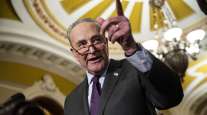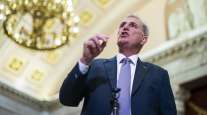Government Shutdown Averted; Funding Extended to Mid-November
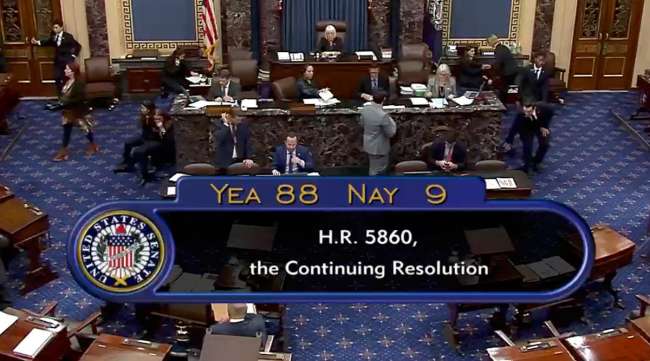
[Stay on top of transportation news: Get TTNews in your inbox.]
WASHINGTON — The threat of a federal government shutdown ended late Sept. 30, hours before a midnight deadline, as Congress approved a temporary funding bill to keep agencies open.
The rushed package drops aid to Ukraine, a White House priority opposed by a growing number of GOP lawmakers, but increases federal disaster assistance by $16 billion, meeting Biden’s full request. The bill funds government until Nov. 17.
After whirlwind days of turmoil in the House, Speaker Kevin McCarthy suddenly abandoned demands for steep spending cuts from his right flank and instead relied on Democrats to pass the bill, at risk to his own job. The Senate followed with final passage.
“We’re going to do our job,” McCarthy (R-Calif.) said before the House vote. “We’re going to be adults in the room. And we’re going to keep government open.”
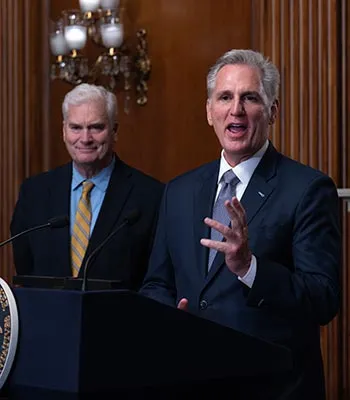
McCarthy (right) and Majority Whip Tom Emmer (R-Minn.) hold a news conference after the House passed the temporary spending bill. (J. Scott Applewhite/Associated Press)
It’s been a head-spinning turn of events in Congress after days of House chaos pushed the government to the brink of a disruptive federal shutdown.
The outcome ends, for now, the threat of a shutdown. If no deal was in place before Oct. 1, federal workers would have faced furloughs, more than 2 million active-duty and reserve military troops would have had to work without pay and programs and services that Americans rely on from coast to coast would have begun to face shutdown disruptions.
“Americans can breathe a sigh of relief,” said Senate Majority Leader Chuck Schumer (D-N.Y.).
The package funds government at current 2023 levels until mid-November, setting up another potential crisis if they fail to more fully fund government by then. The package was approved by the House 335-91, with most Republicans and almost all Democrats supporting. Senate passage came by an 88-9 vote.
But the loss of Ukraine aid was devastating for lawmakers of both parties vowing to support President Volodymyr Zelenskyy after his recent Washington visit. The Senate bill included $6 billion for Ukraine, and both chambers came to a standstill Sept. 30 as lawmakers assessed their options.
“The American people deserve better,” said House Democratic leader Hakeem Jeffries of New York, warning in a lengthy floor speech that “extreme” Republicans were risking a shutdown.
For the House package to be approved, McCarthy was forced to rely on Democrats because the speaker’s hard-right flank has said it will oppose any short-term funding measure, denying him the votes needed from his slim majority. It’s a move that risks his job amid calls for his ouster.
After leaving his right-flank behind, McCarthy is almost certain to be facing a motion to try to remove from office, though it is not at all certain there would be enough votes to topple the speaker. Most Republicans voted for the package Sept. 30 while 90 opposed.
“If somebody wants to remove me because I want to be the adult in the room, go ahead and try,” McCarthy said of the threat to oust him. “But I think this country is too important.”
The White House was tracking the developments on Capitol Hill and aides were briefing the president, who was spending the weekend in Washington.
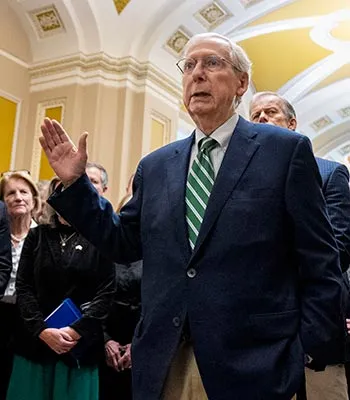
McConnell talks to reporters after a caucus meeting Sept. 30. (Andrew Harnik/Associated Press)
Senate Republican leader Mitch McConnell, who has championed Ukraine aid despite resistance from his own ranks, is expected to keep pursuing U.S. support for Kyiv in the fight against Russia.
“I have agreed to keep fighting for more economic and security aid for Ukraine,” McConnell (R-Ky.) said before the vote.
The House’s quick pivot comes after the collapse Sept. 29 of McCarthy’s earlier plan to pass a Republican-only bill with steep spending cuts up to 30% to most government agencies that the White House and Democrats rejected as too extreme.
“Our options are slipping away every minute,” said one senior Republican, Rep. Mario Diaz-Balart of Florida.
The federal government was heading straight into a shutdown that posed grave uncertainty for federal workers in states all across America and the people who depend on them — from troops to border control agents to office workers, scientists and others.
Families that rely on Head Start for children, food benefits and countless other programs large and small were confronting potential interruptions or outright closures. At the airports, Transportation Security Administration officers and air traffic controllers would have been expected to work without pay, and travelers could have faced delays in updating their U.S. passports or other travel documents.
Other transportation agencies, however, would have continued to operate temporarily during a partial government shutdown. According to background information U.S. DOT provided, the Federal Motor Carrier Safety Administration “has sufficient balances of liquidating cash to operate during a short-term lapse of annual appropriations.”
The agency tasked with regulating commercial trucks and buses is funded primarily by the Highway Trust Fund, an account backed by revenue from federal taxes on gas and diesel fuel.
By Lisa Mascaro, Kevin Freking and Stephen Groves. Associated Press writers Colleen Long and Mary Clare Jalonick contributed to this report. Contributing: Transport Topics’ Eugene Mulero
Want more news? Listen to today's daily briefing below or go here for more info:


